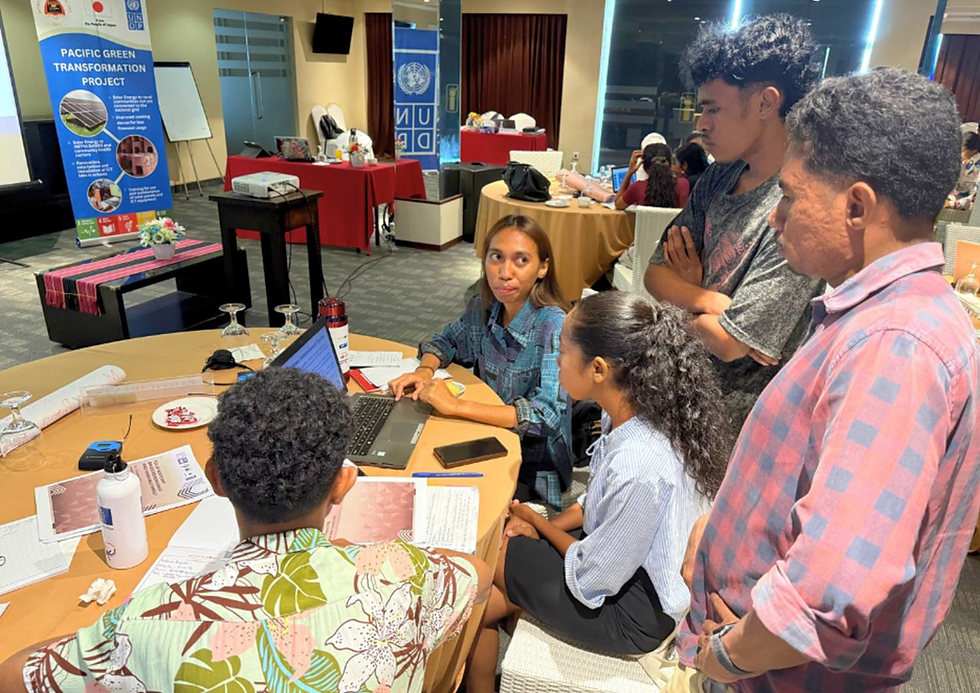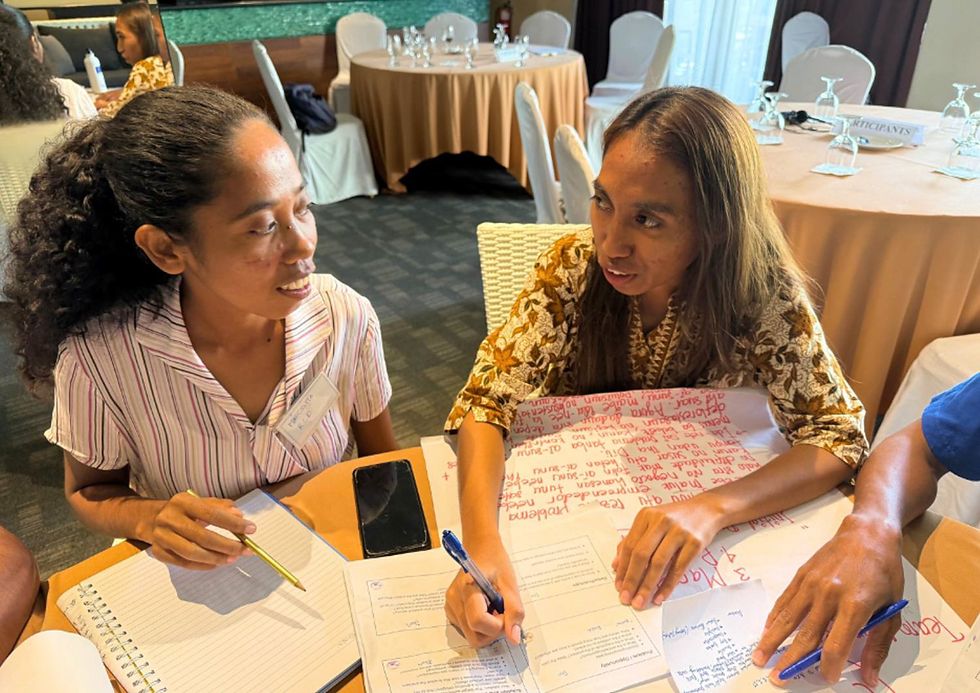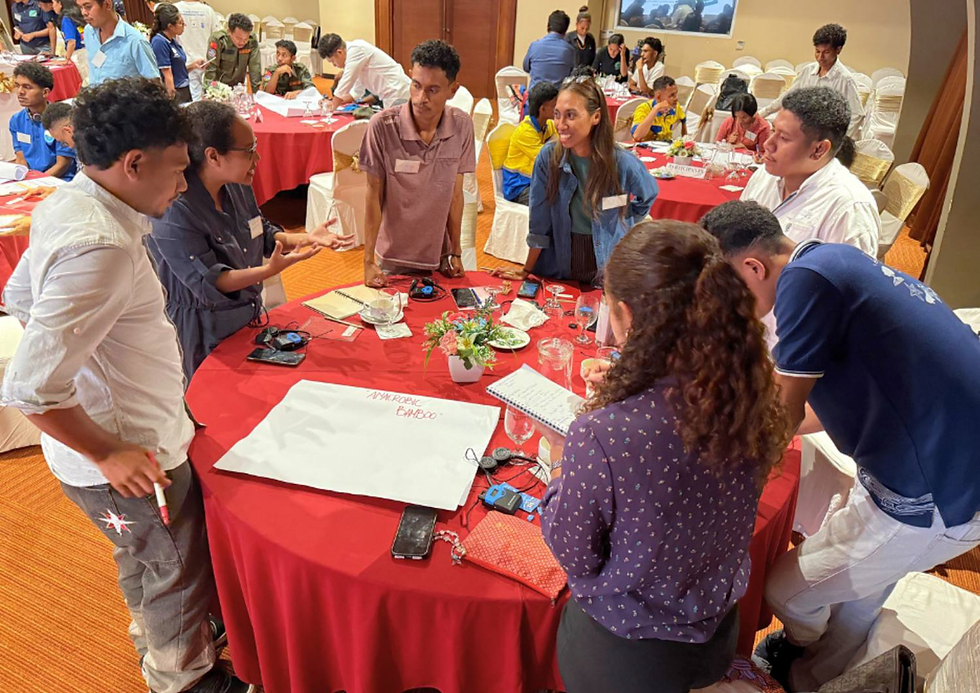My Journey into Renewable Energy
- Hasib Rafi
- Sep 3, 2025
- 5 min read
By Palensia da Costa Silva, Midwife and Youth Climate Advocate, Timor-Leste
Palensia da Costa Silva, a midwife from Timor-Leste, who is also a youth climate advocate, shares how youth-led renewable energy and entrepreneurship is transforming her community.

My name is Palensia da Costa Silva, and I recently graduated with a degree in midwifery from Manufahi Municipality in Timor-Leste. I’ve always known that I wanted to serve my community, especially women and children in rural areas who face daily struggles in accessing healthcare. But I never imagined that my path in maternal health would one day intersect with climate action and renewable energy.
When I participated in two life-changing opportunities, I learned about the direct and devastating impacts of climate change on health, and more importantly, the role that young people like me can play in shaping a more sustainable future through green entrepreneurship.
Climate Crisis at the Frontlines of Health
I have seen how climate change is not only about rising temperatures or extreme weather but also lost lives. In my community, flash floods have claimed the lives of young women especially those going into labour during climate disasters. On top of that, diarrheal diseases and foodborne illnesses are increasing due to poor water and sanitation access, worsened by climate impacts. When roads are flooded or damaged, pregnant women in rural areas can’t reach medical support in time. As a result, we sometimes lose them even before we can help them.
In August 2025, I joined the Local Conference of Youth (LCOY), supported by UNDP Timor-Leste and the Youth Empowerment in Climate Action Platform (YECAP). Over 60 youth leaders discussed these challenges and shared possible solutions including the urgent need to strengthen rural healthcare systems to withstand climate shocks.
We also worked together to draft the National Youth Statement on Climate, which will be presented at COP30. Timor-Leste is already facing significant loss and damage due to climate change. The impacts on sectors like health, education, and agriculture are devastating, ranging from waterborne diseases and damaged infrastructure to crop failures and loss of life. Governments and NGOs have been supporting affected communities, but it’s clear that more must be done to address the scale and complexity of these challenges.
In response, as young Timorese people committed to climate action, we try to make conscious choices in our daily lives, reducing waste, saving water, and protecting nature. We're calling on the government and leaders to support our efforts and meaningfully include us in decision-making processes to ensure a safer, more sustainable future for Timor-Leste. It was powerful to see youth from across the country unite behind this shared vision.

Discovering the Power of Renewable Energy
Soon after LCOY, I was selected to join the YECAP Bootcamp on Entrepreneurship and Renewable Energy, where we explored how clean energy sources, such as solar, wind, and sustainable biomass like bamboo, can contribute to climate solutions. I learned practical business tools such as how to build a project budget, create a business model, and identify target audiences.
What inspired me most was seeing the diverse youth-led project ideas. From eco-tourism powered by solar panels to sustainable chicken farms, we saw how renewable energy could power livelihoods while protecting the planet. Seven projects were developed during the bootcamp including my own: Eco-Bamboo Charcoal, a clean energy alternative that can reduce deforestation and improve women’s health in rural households.
In Timor-Leste, the government has also recognized renewable energy as a national priority. Through its solar energy programmes, outlined in the Strategic Development Plan 2011-2030 and reinforced under the IX Constitutional Government, efforts are underway to expand access to clean and reliable electricity, particularly in rural communities. These national commitments are supported by UNDP and partners through initiatives like the Pacific Green Transformation Project, which is helping to expand solar energy access across municipalities.
Solar power is not only lighting homes, but also enabling children to study at night, ensuring rural health clinics have reliable electricity, and supporting small businesses to grow. For me, this inspires confidence to align my own project ideas, like bamboo charcoal, with Timor-Leste’s broader vision for sustainability.

Bamboo for Resilience and Women’s Empowerment
My project idea focuses on bamboo charcoal and community resilience. Many families still rely on woodfire cooking, which leads to health risks, gender inequality, deforestation, and climate change. I want to raise awareness about bamboo’s benefits as a renewable energy source and support women in my community to turn it into a sustainable product. Bamboo grows quickly, absorbs carbon efficiently, and can provide cleaner fuel alternatives, especially in areas with limited access to gas or electricity.
Since the bootcamp, I plan to identify a suitable production site, determine production capacity, and map out my target market. I’m developing the concept, but my goal is to combine my background in midwifery with the climate entrepreneurship knowledge I gained through these trainings. Imagine midwives using solar energy to power rural health clinics, or women’s groups creating eco-friendly products to earn an income! That’s the future I’m working towards.
Challenges and Hopes for Timor-Leste’s Youth
As Timor-Leste’s Ambassador for Climate Affairs is advocating for youth participation at COP30, it is important to include youth voices and support young people in participating in global climate dialogues.
Youth in Timor-Leste are eager to lead, but we still face real barriers. While digital access and training opportunities like this bootcamp are growing, many young people lack funding or institutional support to bring their ideas to life. Many of us already have access to technology and digital skills. But we need more partners, more mentorship, and more investment to turn our dreams into action.

A Message to Youth Across the Pacific and Beyond
If you’re a young person reading my story, I want to tell you that you don’t have to wait for someone to hand you power. You already have it. Look around your community. What are the problems people face every day? What skills or passions do you have that could help solve them? Then look for opportunities to build your confidence, knowledge, and network.
Climate change is the challenge of our generation. But we can be the ones to turn crisis into opportunity, with courage, collaboration, and creativity, to protect both people and the planet.
In Timor-Leste, I can already see the climate action landscape beginning to shift. More youth are stepping up, learning about renewable energy, and creating practical solutions to real-world problems. With the right support, I believe young people can continue leading Timor-Leste’s green transformation, one community, one idea, and one act of courage at a time.
The Pacific Green Transformation Project (Pacific GX), under UNDP’s Climate Promise and funded by the Government of Japan, supports Papua New Guinea, Samoa, Timor-Leste, and Vanuatu in transitioning to renewable energy and green growth. In collaboration with the Youth Empowerment in Climate Action Platform (YECAP), a regional youth-led platform supported by Sweden and Pacific GX, this initiative highlights how young people across the Pacific are leading the green transition. Pacific GX and YECAP are working together to equip youth with the skills, platforms, and resources they need to drive impactful climate action.
This article was originally published on UNDP Timor Leste here.




Your path toward green energy is incredibly motivating. Working with an academic paper writer made it easier for me to explain difficult ideas in a way that highlighted practical applicability. In addition to inspiring others, sharing experiences and lessons learned highlights the value of commitment and ongoing education in this sector.